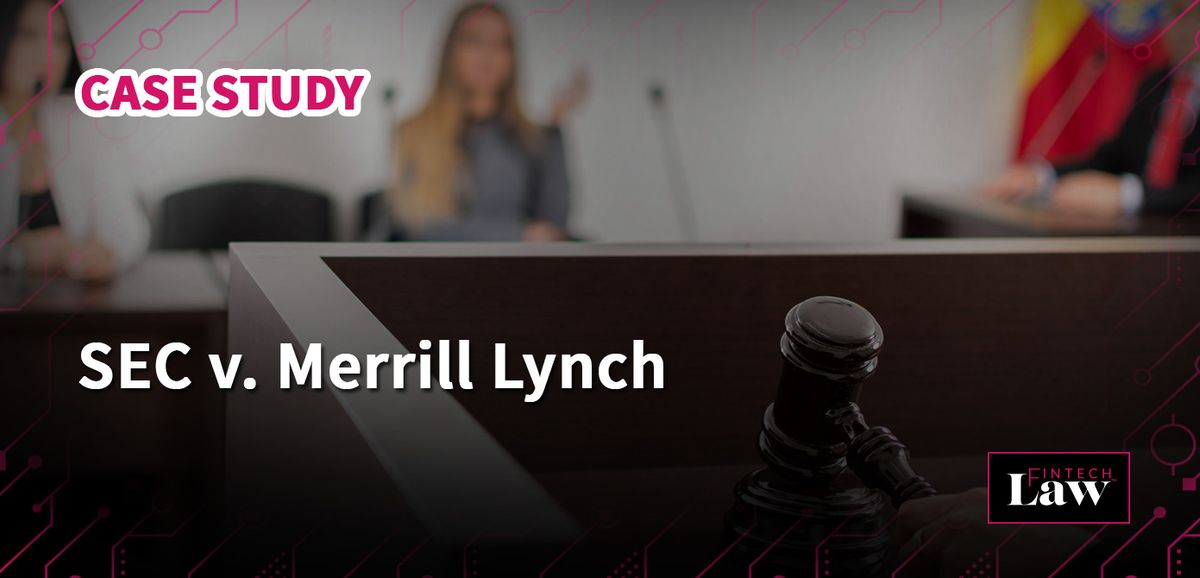Case Study: SEC v. Merrill Lynch, Pierce, Fenner & Smith Incorporated

December 8th, 2024
Table of Content
1. Background
2. Legal Issues
3. Case Outcome
4. Broader Implications
5. Key Takeaways
6. References & Resources
Background
Industry Context
- The late 2000s and early 2010s saw a rise in electronic and algorithmic trading, leading to increased scrutiny of trading practices and the transparency of execution venues.
Company Details
- Merrill Lynch, a wholly-owned subsidiary of Bank of America, is a prominent broker-dealer providing investment management, trading, and brokerage services (“Merrill”).
Key Events Leading to the Case
- This case involves undisclosed fees charged by Merrill to advisory clients for certain foreign currency exchange (“FX”) transactions between May 12, 2016, and June 29, 2020 (the 'Relevant Period').
- Merrill offered clients investment programs known as wrap fee accounts, where clients paid a fixed percentage of assets under management in exchange for a suite of advisory services, including FX transactions. The wrap fee agreements included disclosures about additional charges not covered under the standard program fee.
- Merrill's disclosures indicated that FX transactions involved a markup or markdown, but they failed to reveal an additional fee known internally as a 'production credit.' This fee was added to most transactions, and in over 80% of relevant FX transactions, the production credit was equal to or exceeded the disclosed markup or markdown.
- It's worthwhile to note that after Merrill processed a FX for a wrap fee client, the client was provided with a trade confirmation, but this confirmation failed to identify the fees charged as part of the transaction. Therefore, the markup or markdown was not incorporated in the confirmation the client.
- During the Relevant Period, Merrill charged approximately $4.1 million in undisclosed production credits across more than 15,000 FX transactions affecting nearly 4,900 client advisory accounts. Portions of these fees were distributed to financial advisors and recorded as commissions to these financial advisors, in internal documents.
Legal Issues
Allegations/Claims/Violations
- Merrill's failure to adequately disclose these additional fees led to violation of the U.S. securities laws, specifically:
- Section 206(2) of the U.S. Investment Advisers Act of 1940 (the “Advisers Act”): This act prohibits investment advisors from engaging in transaction(s) that is fraudulent or deceitful upon an existing client, or a future, prospective client.
- Section 206(4) of the Advisors Act and Rule 206(4)-7: It is determined that Merrill willfully violated Section 206(4) of the Advisors Act, as well as Rule 206(4)-7, which, among other aspects, require registered investment advisor(s) have to have written policies and procedures to prevent violations of the Advisors Act, and these should be written policies.
Case Outcome
Verdict/Settlement
- Merrill settled the case for $42 million without admitting or denying guilt.
- The settlement included a censure and enhanced compliance requirements.
Implications
- Financial penalties and reputational damage highlighted deficiencies in Merrill's trading operations.
- Merrill faced increased scrutiny from regulators and the public, necessitating enhanced transparency and compliance measures.
Broader Implications
For the Fintech Industry
- The case of the SEC v Merrill underscored the importance of transparency for transactions conducted on behalf of clients by investment companies.
- The case also highlights the risks associated with misleading trade reporting.
- Broker-dealers and fintech platforms must prioritize accurate reporting and compliance with regulatory standards, and be forthcoming and transparent to their clients or prospective clients.
Regulatory Trends
- Enhanced scrutiny of trading venues and practices by the SEC and global regulators.
- Emphasis on algorithmic and high-frequency trading audits.
Future Considerations
- Fintech companies must invest in robust compliance and risk management systems to avoid similar pitfalls.
- Policies need to be in writing.
- Transaction fees must be disclosed to clients, and/or to prospective clients.
Key Takeaways
Lessons Learned
- Transparent reporting of trading practices is critical for maintaining customer trust and regulatory compliance.
- Algorithmic and automated systems require diligent oversight to prevent abuse.
- Proactive disclosure of potential issues can mitigate regulatory penalties and reputational harm.
Practical Tips
- Conduct regular audits of trading practices and algorithms.
- Establish clear protocols for trade reporting and venue disclosures.
- Invest in compliance technology to ensure adherence to regulatory standards.
- Be open and transparent to clients and prospective clients about transactions, transaction fees, and all other aspects in investment and trading, as is required by law.
References & Resources
- SEC Press Release: Merrill Lynch to Pay $42 Million for Misleading Customers in Trading Operations.
- Direct Case Link: www.sec.gov/files/litigation/admin/2023/34-97242.pdf.
- Securities Exchange Act of 1934, ensuring fair and transparent markets.
- Investment Advisors Act of 1940, which regulates companies involved with mutual funds, investing, trade and securities.
Book Consultation
Need help understanding how to ensure compliance and transparency in your Fintech company?
Contact us today for a consultation.
